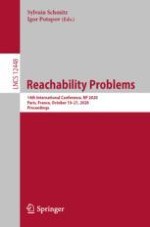2020 | OriginalPaper | Buchkapitel
Quantum-over-Classical Advantage in Solving Multiplayer Games
verfasst von : Dmitry Kravchenko, Kamil Khadiev, Danil Serov, Ruslan Kapralov
Erschienen in: Reachability Problems
Aktivieren Sie unsere intelligente Suche, um passende Fachinhalte oder Patente zu finden.
Wählen Sie Textabschnitte aus um mit Künstlicher Intelligenz passenden Patente zu finden. powered by
Markieren Sie Textabschnitte, um KI-gestützt weitere passende Inhalte zu finden. powered by
